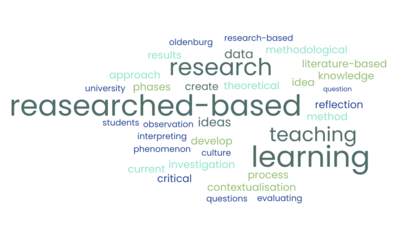Why research-based learning?
Why research-based learning?
Research-based learning at the University of Oldenburg
Research-based learning is one of the highlights of teaching at the University of Oldenburg. Learning objectives inherent in research-based learning serve as a guideline for developing various degree programmes, modules and individual courses.
What characterises research-based learning?
Research-based teaching and learning is a constructivist-based approach to learning in which students learn through research. Instructors support this process by teaching in a way that does not present topics as closed, but rather opens them up for students to research. Instructors and students shape the learning process together.

Research-based learning...
- encourages a high level of student participation.
- ties in students' interest in topics.
- enables collaborative learning.
- promotes the ability to independently develop problem-solving strategies necessary for both research activities and professional practice.
- promotes critical academic thinking through participating in the process of knowledge creation.
Research-based learning process
The research-based learning approach is based on the idea that academic education consists of thinking beyond the curriculum and competences set therein, of questioning established knowledge and becoming active in the academic pursuits by developing an inquiring mind. When students learn through researching, they go through characteristic stages of an open-ended research process, developing thus their academic and professional competences and expanding their knowledge independently. These stages include:

Developing a research question

Literature-based contextualisation within current research

Choosing a well-grounded theoretical approach and a research method

Conducting a methodological investigation or observation of a phenomenon

Evaluating and interpreting research data

Formulating and presenting results and critically reflecting on them
Showcase for research-based learning
When students learn through research, they think beyond the curriculum, question established knowledge and develop an inquiring mind. There are many ways to achieve this. But where and how to start?
On this page you will find information about and inspiration for research-based learning – both examples of course designs as well as student research.
Icons Freepik (www.flaticon.com)
